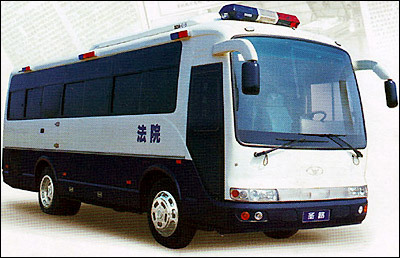Apparently David Frum of the American Enterprise Institute was in Taiwan recently, and he wrote a few pieces about La Isla Formosa. Haven’t had much time to follow the ‘net over the past few weeks (belated congratulations on blog post #2000, Michael!), so apologies to anyone who has already posted these links.
Frum gives a good summary of China’s behavior towards Taiwan here.
Even better is his second piece (though it’s a bit deceptively-titled). He certainly grasps that left-right labels aren’t really applicable to Taiwanese politics:
The "left-wing" DPP has proposed to purchase American warships, surveillance craft and interceptor missiles. It presses the U.S. to engage in joint training exercises with Taiwanese forces, to allow U.S. naval vessels to call at Taiwan ports and to change current policy so as to allow serving generals and admirals to visit Taiwan.
The "right-wing" KMT prefers detente. It has used its majority in Taiwan’s parliament to stall the DPP’s arms purchases. It advocates closer contacts with China even if China refuses to recognize Taiwan. Some of its members voice rising doubts about the relevance of the U.S.-Taiwan alliance. Leading KMT members have travelled to Beijing to hold party-to-part talks with leading
Chinese Communists.
(My favorite moment a few years back was when "left-wing" Vice-President Annette Lu channeled Ronald Reagan, calling China "an empire of evil". A statement which the "right-wing" KMT hastened to denounce as "China-bashing".)
He closes this one with a concern many of us here have had for a long time:
One hears persistent rumors in Taiwan that the Chinese Communists pressure Taiwan businessmen with interests on the mainland to make campaign donations to their ancient enemies in the KMT. China ranks among the most corrupt countries on Earth. Young democracies are vulnerable to external corruption.
I travelled to Taiwan worried that the Chinese might try to invade the island. I returned worrying that China will try to buy it.
Over at his blog with the National Review, he gives a book review of Minxin Pei’s China’s Trapped Transition: The Limits of Developmental Autocracy. One highlight:
* The Chinese Communist party’s grip on power is tightening, not loosening. While 60% of entrepreneurs who launched businesses in the 1980s were workers, peasants, or other ordinary people, by 2002, two-thirds of China’s business owners were former government officials, party cadres, or executives of state-owned enterprises. This is not a case of successful businessmen opportunistically joining the ruling party. Rather, it seems that the ruling party is opportunistically seizing successful businesses.
[…]
Pei argues that these disturbing trends represent something more than growing pains. He argues that they inhere in the path the Chinese Communist Party chose for the country it rules.
The great problem facing any state is how to control the actions of its agents. In a democracy, we rely on a free press to alert us to abuses by the government and competitive elections to correct them. Mao Tse-Tung’s version of communism relied on capricious and all-enveloping terror. But when the Chinese reformers semi-opened their economy, while sedulously denying political freedom, they loosened their control of their agents – while creating lucrative new incentives for their agents to siphon wealth away for themselves.
A vicious cycle has been unleashed. The richer China grows, the more reluctant the ruling elite becomes to surrender power, because power has become so much more valuable. But the refusal to loosen the grip on power undermines China’s wealth, by creating unchecked incentives to the state’s agents to prey upon wealth creation. [emphasis added]
Elsewhere, George Will points out that James Mann has something similar to say in The China Fantasy: How Our Leaders Explain Away Chinese Repression:
[Mann’s] most disturbing thesis is that "the newly enriched, Starbucks-sipping, apartment-buying, car-driving denizens" of the large cities that American visitors to China see will be not the vanguard of democracy but the opposition to it. There may be 300 million such denizens, but there are 1 billion mostly rural and very poor Chinese. Will the minority prospering economically under a Leninist regime think majority rule is in their interest?
Maybe this is piling on, but Guy Sorman says much the same:
Still, hasn’t [economic] growth [in China] created an independent middle class that will push for, and eventually obtain, greater political freedom? Many in the West think so, looking to the South Korean example, but [dissident economist] Mao Yushi isn’t convinced. What exists in China, he argues, is a class of “parvenus,” newcomers whose purchasing power depends on their proximity to the Party rather than their education or entrepreneurial achievements. Except for a handful of genuine businessmen, the parvenus work in the military, public administration, or state enterprises, or for firms ostensibly private but, in fact, owned by the Party. The Party picks up the tab for almost all their imported luxury cars, two-thirds of their mobile phones, and three-quarters of their restaurant bills, as well as their call girls, their “study” trips abroad, and their lavish spending at Las Vegas casinos. And it can withdraw these advantages at any time.
In March, the Chinese government announced, to much fanfare in the Western press, that it would begin to introduce individual property rights. We should understand that this “reform” will benefit only the parvenus, not the peasants, whose tilled land will still belong to the state. But the parvenus will now be able to transmit to their children what they have acquired thanks to their Party connections—one more reason that they will be unlikely to push for the democratization of the regime that secures their status.
Speaking of democratization, Sorman gives us an idea of just how much democracy Taiwan can expect to retain should the KMT’s dream of reunification ever be implemented:
…like everybody else, the Chinese love to watch TV, despite pervasive censorship and the propaganda broadcast on it in China. One of their favorite shows is a local version of the U.S. hit American Idol called Super Girl, broadcast by a Hunan satellite channel and produced by a private firm. In 2005, the winner of this amateur singing contest was Miss Li, a lanky 20-year-old with a punk hairdo, sporting jeans and a black T-shirt—a fashion inspired by South Korean pop bands. Miss Li won democratically with nearly 4 million votes, text-messaged by viewers using their cell phones from home. Over 400 million Chinese viewers—more than the combined populations of the United States and England—watched the finale.
An unexceptional story—except that it happened in China, and the Communist Party, taken by surprise, condemned Miss Li for not singing in Chinese but in English and Spanish and for wearing clothes that didn’t conform to the anodyne official dress code laid down by the national television station. A columnist in China Daily, the Party’s mouthpiece, interpreted her victory as a popular uprising against the established order, concluding that “Miss Li has been elected but the people have made a bad choice. This is what happens when people are unprepared for democracy.” [emphasis added]


